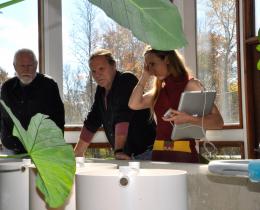Omega strives to find source food that is local, organic, and sustainable for our menus—and the coffee is no exception. In this case we look for organic, shade grown, and fair trade coffee—a commitment that has far-reaching implications for social justice and environmental conservation.
4 Key Criteria for Omega's Coffee
1) Local. Coffee is not grown in New York. But that doesn't mean we can't support our local economy. While coffee is grown elsewhere, the beans are often shipped unroasted. We search out local roasters who know the farms where their beans are coming from.
2) Organic. Sourcing coffee that has an organic certification means that the farm does not use harmful pesticides of any kind and follows other strict regulations that minimize environmental damage from growing the beans.
3) Shade Grown. Shade-grown coffee certification minimizes the impact that coffee farming has on birds, mammals, plants, and insects in the habitat surrounding the coffee farm. This is done by keeping tree canopies instead of clear-cutting to make room for coffee plants.
4) Fair Trade. Fair trade coffee certification ensures that the labor practices on the coffee farm are fair and just for workers. We aim to support companies that have sustainable business practices, including supporting workers rights.
While Omega strives to serve coffee that fills everything on our wish list, sometimes certain coffee varieties only meet some of the criteria. Perhaps a variety lacks shade-grown certification but meets all our other requirements. In this case we look to see what else is available, assess the environmental and social impact of our options, and make the decision that integrates as many of our preferences as possible.
Your Chance to Try Something New
Many of our participants have never tried organic, fair trade, or shade-grown coffee. Perhaps it's not readily available to them at home or it's too expensive. Or maybe they have their favorite and they haven't wanted to try something new. At Omega, they have the chance to give it a try in the dining hall or at the Omega Café.
If participants like the coffee and ask about it, we have the opportunity to engage them in conversation about how using organic, fair trade, shade-grown coffee allows us to reduce our ecological footprint and help promote fair labor practices. We invite them into the global conversation about resources and consumption. Perhaps it’s the first time they have considered the consequences of their choice of coffee beyond personal preference, habit, and price.
We hope when they return home they look up a local roaster that uses, organic, fair trade, shade-grown beans. In this way we hope to inspire people to ask themselves what values they look for in their food and encourage them to make choices that will help us create a more sustainable world.



